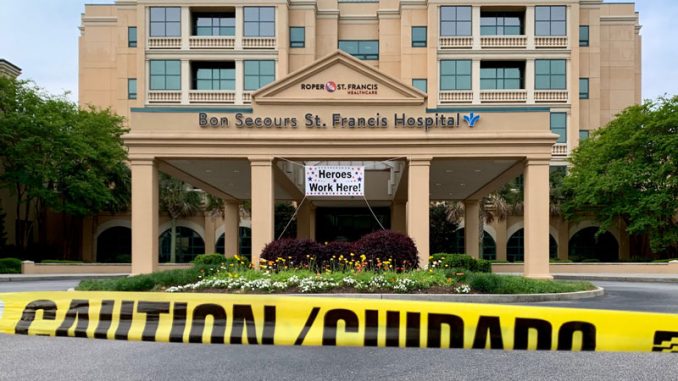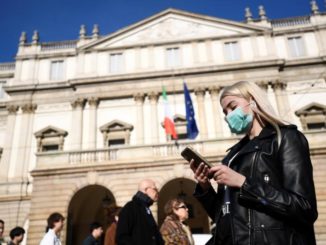
CHARLESTON—Self-quarantine and community restrictions are changing on an almost daily basis, but experts say it’s still critical to maintain proper precautions to try to prevent the spread of coronavirus.
Gov. Henry McMaster said April 27 that he will extend South Carolina’s State of Emergency for 15 more days, which means all of his executive orders will be kept in place, including the mandatory home or work order issued earlier this month.
This means that there will be no Masses at Catholic churches until the rule changes, much to the dismay of many.
Dispensations from Mass are still in place, but some churches are remaining open to allow people in for private prayer. Dr. Chris Raispis, a physician at Detyens Medical Center in North Charleston, understands the desire of those who want to go into a sacred space to pray, but he urges them to be extra cautious. Raispis, a member of the Cathedral of St. John the Baptist in Charleston, advised people to follow the guidelines that the Centers for Disease Control provides for the general public — keep an appropriate distance away from others and sterilize your hands with hand sanitizer or soap and water.
“If the church looks fairly crowded, I would not go in,” he said. “If you do, assess how many people are in there, find your own space and minimize contact with other people.”
Then, he advised, people need to do their due diligence in regard to cleaning their hands when leaving the church, especially using hand sanitizer before they get into their cars.
“Hand sanitizer works,” he said. “In my opinion, it is the best thing you can do to avoid cross contamination (such as the steering wheel in your car).”
The CDC recommends using a 60 percent ethanol base hand sanitizer. Raispis said it is important to remember to rub the sanitizer on until it dries. People also need to take care of themselves and be mindful of any symptoms they might have, he said. Common symptoms include fever, tiredness, and a dry cough. Some people may experience aches and pains, nasal congestion, a runny nose or sore throat. On average it takes less than a week from when someone is infected with the virus for symptoms to show, but it can also take up to two weeks. People with mild symptoms who are otherwise healthy should self-isolate. Seek medical attention if you have a fever, a cough, and difficulty breathing. Call ahead.
“We can’t completely stop our lives, but we can certainly do our part in not spreading this virus or any virus,” he said. “But it only works if we all follow the same rules.
This is uncharted territory and we are learning as we go along.”
Dr. Robert Olivero, M.D., is the chief medical officer of ambulatory care and population health at Roper St. Francis Hospital. He and his wife, Jennifer, belong to St. Clare of Assisi Church on Daniel Island, and their two children, Samuel, 14, and Caroline 11, attend Christ Our King – Stella Maris School.
He said the best thing people can do during this time is to continue to stay home, follow guidelines and not give in to fear.
“Think less about the virus and more about how not to catch the virus,” he advised. “There are ways to keep from getting it and we have to focus on that. You can focus on the fear you have, or you can focus on how to keep yourself from getting the virus. This is done through social distancing, coughing in your sleeve, hand hygiene and staying out of crowds.”
When asked if the health care providers on the front lines were in need of supplies, his response was not about masks or ventilators.
“We always appreciate the prayers, but we also need you to listen to what folks are telling you about social distancing,” he said. “We are here to take care of patients and take care of them safely. Catholics must listen to what the mayors and governors say. Of all the things you can do for me, that is the most important.”
Dr. Oliviero said he wants people to be able to practice their faith and understands that Mass is central to it.
“But If you can do it virtually, that’s the best way,” he said.
He suggested that family members do their best to help seniors 65 and over get on streaming platforms so they can remain in touch with their faith while remaining safe from infection.
“Check up on seniors in your congregation and give them a call. Reach out, ask how they are doing. You can be in contact without being in physical contact. We can’t be afraid of everything, we just have to be smart,” he said.



